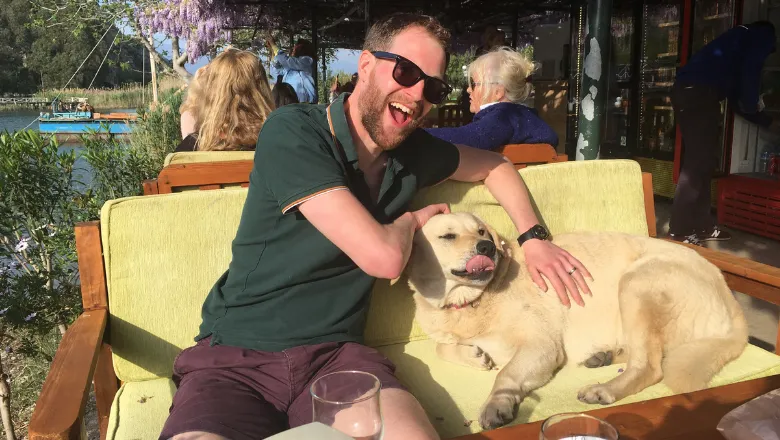17 April 2019
5 minutes with Mark Howard
Dr Mark Howard is a research associate in the Peter Gorer Department of Immunobiology and is working on the role of the complement system in renal transplantation. Mark did his PhD between Manchester and Pittsburg before joining Queen Mary’s and then King’s where he ‘learnt to be an immunologist’

Briefly, tell me about your background and career up to this point at King’s?
I’ve been fortunate enough to have had quite a varied background, with each role following on from what I enjoyed most about the previous. I began studying medicine after A levels but really didn’t enjoy it and dropped out, I then transferred to a genetics degree as that was what had interested me the most during the MBBS and everything just continued from there!
I did my PhD jointly at the Universities of Manchester and Pittsburgh on the embryonic development of articular cartilage and its role in arthritis. Working with two PIs across the Atlantic could be challenging but it was a fantastic experience.
After that, I worked at Queen Mary’s looking at imprinted genes and their role in maternal response to pregnancy, and finally, I came to King's and learnt to be an immunologist.
What research are you currently working on?
We are looking at a protein called CL-11 which is a recognition molecule of the complement system of innate immunity. During kidney transplants, the donor organ goes through periods of ischaemia and reperfusion which causes complement activation through CL-11. This complement activation ultimately damages the kidney tubules and can contribute to organ rejection. Our work has been on examining this pathway, up and downstream of CL-11 as well as searching for therapeutic strategies to block CL-11 and therefore increase the success of kidney transplants.
It’s really exciting to be working on something that could have a massive impact on patients in a few years time.
What is a typical day like for you?
My days vary between mostly lab work, whether it’s working on growing cells, doing assays or staining tissue, or desk work to write things up. We also meet regularly as a lab informally or formally to discuss recent results and troubleshoot.
Obviously, some days are more exciting than others, some days you can spend ages doing the necessary boring things like refiling nitrogen tanks, and others you might be flying off to a conference.
Where is your research area heading in the next five years?
We hope to have a number of candidates for blocking CL-11 signalling in the kidney during transplants and to have begun the process of transferring them to the clinic. We also have some promising recent data on a brand new pathway that is extremely exciting and in five years we should’ve worked it out!
What would you like members of our school to most know about you and your research area?
CL-11 is not just important in the kidney so if anyone wants to talk about it please contact me.
What is your favourite part of your current role?
I really enjoy learning new things, and this post has certainly delivered that. Amongst many other things, I’ve learnt how to do new techniques, including new imaging processes, and collaborated with other scientists all over London. I’ve also had more independence and opportunities to take on students and learn about the funding side of academia.
What do you do with your time outside of academia?
I swim and run, but have just taken up a new sport in tower running, where I’ve been competing around London to climb the stairs in a building as fast as possible. It’s a great sport for strength and aerobic conditioning and if you are interested there is a big race in July (information can be found here).
What advice would you give to your 18-year-old self?
Don’t take yourself so seriously
Who do you look up to (inside or outside of academia)?
Michael Phelps
Any leaving remarks that you would like other members of our school to know about you?
I love data.
QUICK-FIRE:
Favourite Movie: Rocky
Favourite Book: Legend by David Gemmell
Favourite TV Show: Game of Thrones
Favourite Scientist: Kerry Mullis
